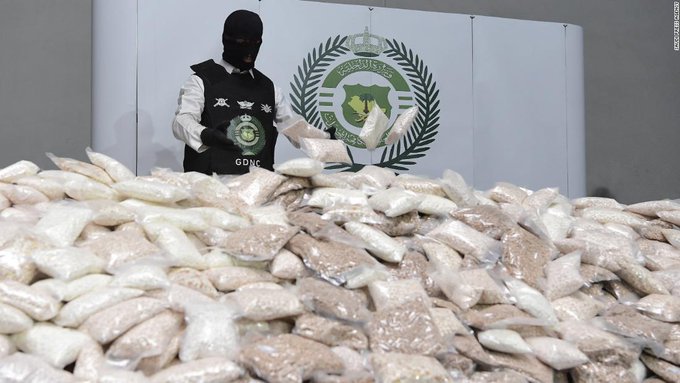
International geopoliticalfutures.com revealed the secrets of the government’s role in the excessive promotion of drugs in Saudi Arabia within the policies of entertainment and distraction for the citizens of the Kingdom.
The website published a report entitled Saudi Arabia: The Drug Hub of the Middle East.
The report highlighted the role of Mohammed bin Salman in flooding the country with drugs to keep young people away from politics and distract them from demanding more rights, especially with the arrest of scholars and the disappearance of reformists and youth counselling centres.
The report indicated that almost no country is free from the scourge of illegal drugs. Still, Saudi Arabia – the custodian of Islam’s holiest sites – is emerging as one of the world’s most prominent destinations for illicit substances.
This problem has only grown over the past decade. Between 2015 and 2019, Saudi Arabia accounted for more than 45% of global seizures of the amphetamine drug called Captagon.
The Saudi government refuses to acknowledge the seriousness of the situation and blames it on foreign parties. On the other hand, members of the royal family and the security forces were involved in the spread of drugs.
The Saudi government hid the seriousness of the problem for a long time. According to official estimates issued by the Saudi Ministry of Interior, the number of drug addicts in the country has reached 200,000. Still, some civil society organisations indicate that the actual number is much higher.
Saudi Arabia is the third largest drug consumer in the world and the largest in the Middle East. Drug use and smuggling are punishable by death, but that applies to ordinary citizens and expatriates, not members of the royal family, who are exempt from prosecution.
Drug use is rising, especially among young men and women in urban areas between 18 and 29.
More than 60% of drug addicts belong to this age group, and it is estimated that about half of Saudis who use drugs are unemployed.
According to statistics, 90% of addicts are Saudis, while the remaining 10% are expatriates, representing 40% of the country’s population (35 million).
Captagon pills, promoted as helpful in losing weight and increasing concentration, are the most popular drug in Saudi Arabia, and more than 40% of addicts use them.
However, Saudi Arabia blamed Lebanon and accused Hezbollah of smuggling drugs into the Kingdom.
However, the amount of drugs coming from Lebanon is small compared to other countries, such as Afghanistan, Iran, Syria and Iraq.
The Kingdom does not want to confront tribes that receive large bribes from drug traffickers and instead resorts to conspiracy theories to explain the problem.
Local media claims that Saudi Arabia is a target for international criminal gangs linked to hostile entities working to flood the country with drugs to destroy its social fabric and undermine its Islamic values.
But the truth is that princes and officers are heavily involved in local smuggling networks. The Control and Anti-Corruption Authority has even accused its officers of taking bribes from smugglers to turn a blind eye to their illegal activities.
Six months ago, a Saudi security officer was arrested at Beirut airport while trying to smuggle 16 kilograms of Captagon pills to Saudi Arabia via Kuwait.
Members of the royal family use their immunity from prosecution to smuggle drugs into the Kingdom and other countries. They are also alleged to be avid cocaine and hashish consumers.
Social boredom with the transformations the Kingdom is going through is increasing with the worsening of addiction rates. The lack of available jobs with adequate salaries is also a reason for drug use among young people. With an expensive lifestyle entrenched in the Kingdom, young people find it challenging to meet expectations, especially regarding marriage and housing.